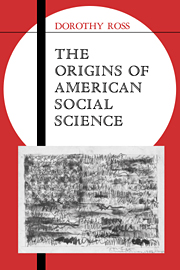Book contents
- Frontmatter
- Contents
- Acknowledgments
- Abbreviations used in the footnotes
- Introduction
- Part I European social science in antebellum America
- Part II The crisis of American exceptionalism, 1865–1896
- Part III Progressive social science, 1896–1914
- 5 The liberal revision of American exceptionalism
- 6 Marginalism and historicism in economics
- 7 Toward a sociology of social control
- 8 From historico-politics to political science
- Part IV American social science as the study of natural process, 1908–1929
- Epilogue
- Bibliographical note
- Indexes
- Ideas in Context
5 - The liberal revision of American exceptionalism
Published online by Cambridge University Press: 23 September 2009
- Frontmatter
- Contents
- Acknowledgments
- Abbreviations used in the footnotes
- Introduction
- Part I European social science in antebellum America
- Part II The crisis of American exceptionalism, 1865–1896
- Part III Progressive social science, 1896–1914
- 5 The liberal revision of American exceptionalism
- 6 Marginalism and historicism in economics
- 7 Toward a sociology of social control
- 8 From historico-politics to political science
- Part IV American social science as the study of natural process, 1908–1929
- Epilogue
- Bibliographical note
- Indexes
- Ideas in Context
Summary
During the Gilded Age, Americans faced for the first time the possibility of historical change, and the chance that America might turn toward socialism raised the issue of historical change in its most acute form. The major figures of the Gilded Age who remained powerful into the Progressive Era – John Bates Clark, E. R. A. Seligman, Albion Small, and Franklin Giddings – as well as newer voices that emerged at the turn of the century – Irving Fisher, Frank Fetter, Simon Patten, and Thorstein Veblen in economics; Edward A. Ross and Charles Horton Cooley in sociology; John Dewey in philosophy – were profoundly influenced by the Gilded Age crisis. Most of them struggled with socialism and tried now to escape its ideological polarization. Revising the exceptionalist ideal, they reconstituted their disciplines on the basis of liberal principles and liberal conceptions of history. The paradigms they formulated – neoclassical economics, liberal economic interpretations of history, a sociology and ideology of social control, and pragmatism – laid the groundwork for twentieth-century social science. Thorstein Veblen was the great exception to this liberal revisionism, for he retained his Gilded Age socialism, and claimed for it the warrant not of ethics, but positivist science. When we turn again to historico-politics, we will find that there too, a liberal vision of American exceptionalism held sway among such new leaders as Frank Goodnow, Woodrow Wilson, and Frederick Jackson Turner.
- Type
- Chapter
- Information
- The Origins of American Social Science , pp. 143 - 171Publisher: Cambridge University PressPrint publication year: 1990

